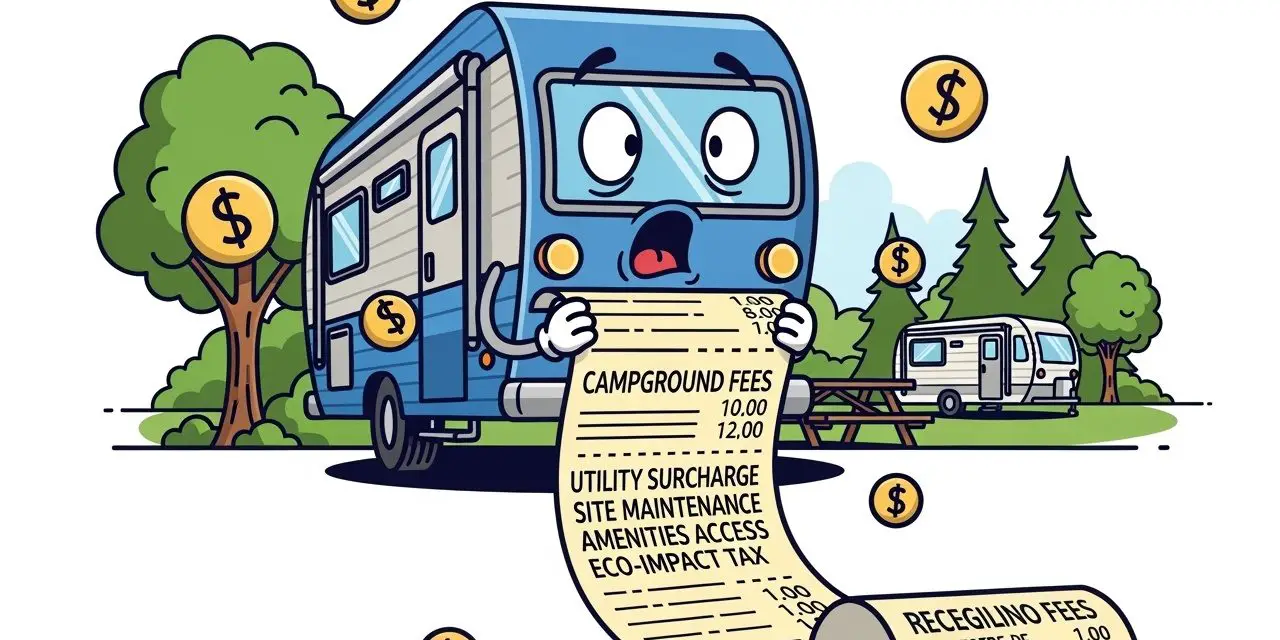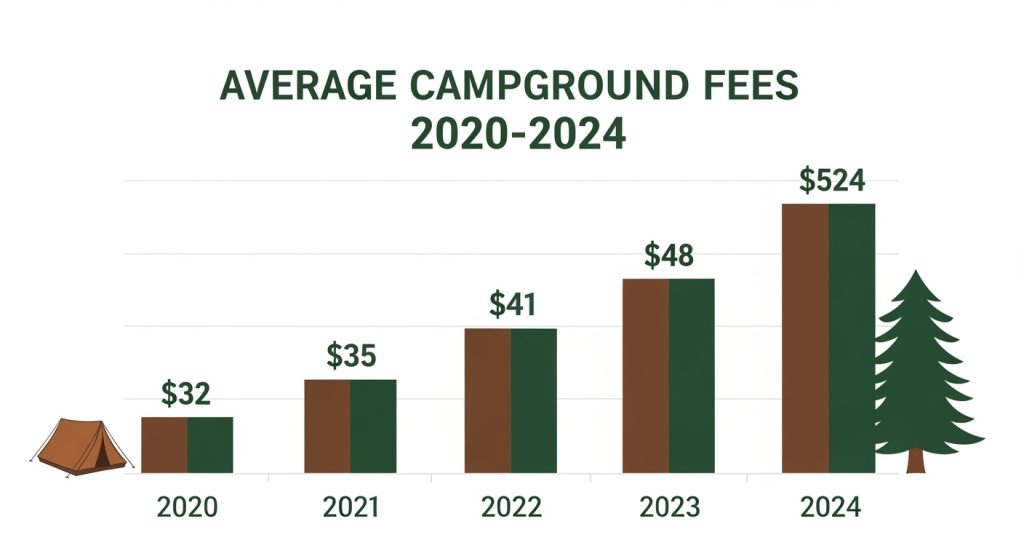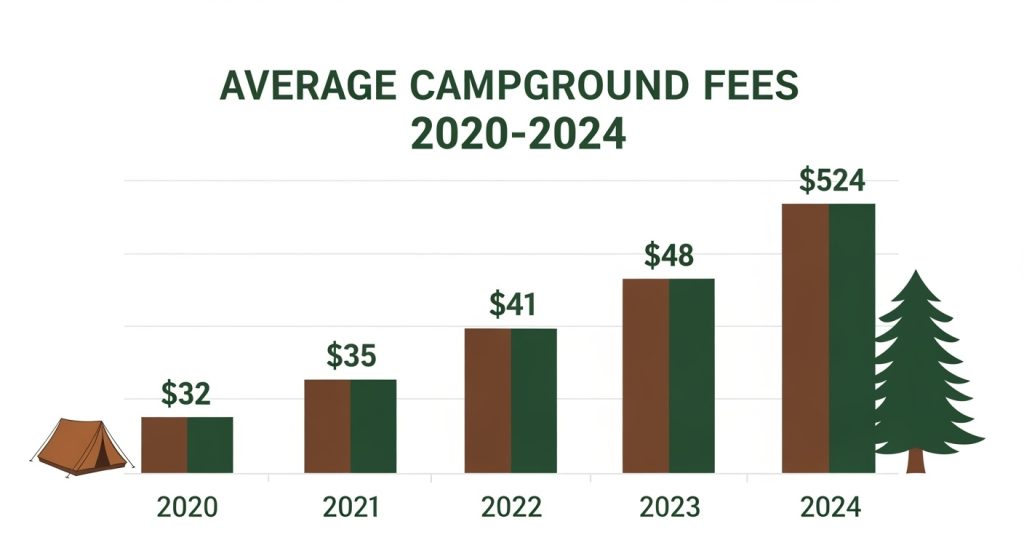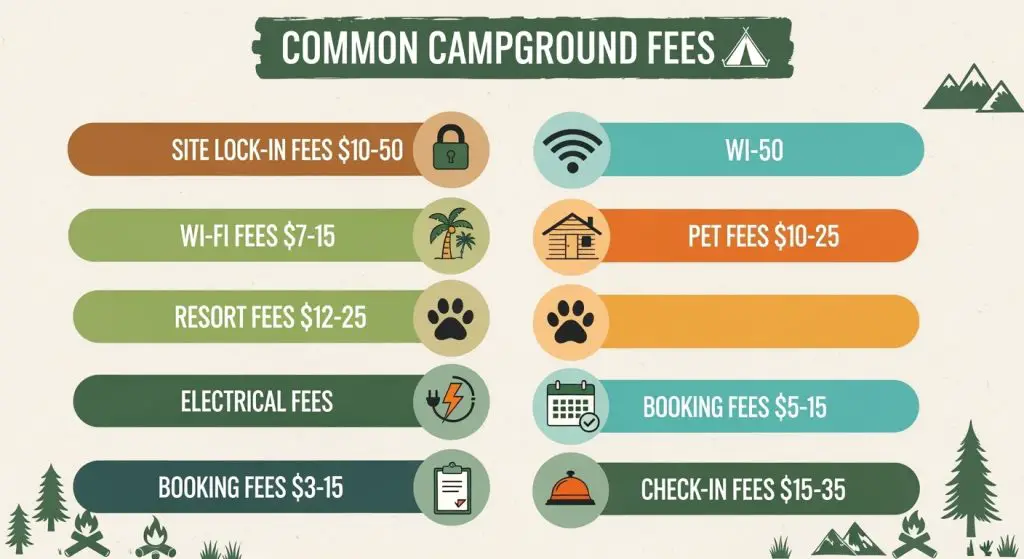Would you like to save this article?
You’ve been dreaming of that perfect RV getaway for months, meticulously planning your route and researching the best campgrounds along the way. But when you finally click “book now,” you’re hit with a sticker shock that makes your morning coffee seem like a bargain. Welcome to the new world of campground fees, where booking a simple patch of grass and gravel can cost more than a luxury hotel room in some cities.
The days of pulling into a campground for $18 a night are long gone, replaced by an intricate web of fees that would make airline executives blush. From “site lock-in” charges to “fresh air fees” (yes, that’s becoming a thing), today’s campground operators have turned what used to be a simple outdoor experience into a financial maze that requires a calculator, a lawyer, and possibly a therapist.
According to recent industry data, campground fees have increased by 52% since 2018, with private campgrounds now averaging $78 per night compared to state parks at $55. But it’s not just the base rates that are climbing – it’s the avalanche of additional fees that’s really crushing your camping budget.
You’re not alone in feeling frustrated by these charges, and understanding what you’re up against can help you make better decisions for your next outdoor adventure. Let’s dive into the most ridiculous fees that campgrounds are now charging and explore how you can navigate this expensive landscape without breaking the bank.
1. The Infamous “Site Lock-In” Fee
The most notorious of all campground fees is the “site lock-in” charge, which can range from $10 to $50 per reservation. This fee supposedly guarantees you’ll get the exact campsite you selected when booking online.
What the Research Shows:
- Site lock-in fees range from $10-50 per booking
- 68% of private campgrounds now charge this fee
- KOA and Jellystone Parks are leading adopters
- Some campgrounds charge up to $35 just to “cement your tires into the ground”
The Reality Check: You’re essentially paying extra for something that should be included in your reservation. It’s like going to a restaurant, ordering a steak, and then being charged an additional fee to actually eat it instead of watching them serve it to someone else. The audacity is breathtaking, and the worst part is that campgrounds act like they’re doing you a favor by allowing you to keep what you already paid for.
2. Wi-Fi Fees (That Don’t Actually Work)
Many campgrounds now charge $7-15 per night for Wi-Fi access, with some charging separate fees for “basic Wi-Fi” and “premium Wi-Fi that actually works.”
Statistical Reality:
- Average Wi-Fi fee: $7-15 per night
- 45% of campground Wi-Fi doesn’t reach advertised speeds
- Premium Wi-Fi fees can add $11 more per night
- Some resorts charge $25+ for “high-speed” internet
The Irony: You’re paying premium prices for internet that barely loads your email while your phone’s hotspot works perfectly fine. It’s like paying for a sports car and getting a bicycle with one flat tire. The best part? They’ll gladly sell you “premium Wi-Fi” for even more money, which still won’t let you stream anything without buffering every 30 seconds.
3. Resort Fees for “Amenities” You Don’t Want
Private campgrounds love tacking on resort fees of $10-25 per night for amenities like pools, playgrounds, and activities you’ll never use.
By the Numbers:
- Average resort fee: $12-25 per night
- 78% of RV resort campgrounds charge these fees
- Fees apply whether you use amenities or not
- Can add $175+ to a weekly stay
The Absurdity: You’re essentially subsidizing someone else’s kids’ pool time when all you wanted was a place to park your RV for the night. It’s like being charged a “restaurant fee” at a hotel because there’s a restaurant on the property, even though you packed your own sandwiches and have no intention of dining there.
4. Pet Fees That Cost More Than Human Guests
Pet fees have skyrocketed, with some campgrounds charging $10-25 per night per pet, plus additional “pet amenities” fees.
Shocking Statistics:
- Average pet fee: $10-25 per night per pet
- Some campgrounds charge more for pets than extra humans
- “Pet spa” fees can add another $15-30
- 89% of pet-friendly campgrounds charge these fees
The Ridiculous Reality: Your well-behaved golden retriever apparently requires more expensive accommodations than your teenage son. At least your dog doesn’t leave wet towels on the floor or complain about the Wi-Fi speed. Yet somehow, Rover’s presence justifies a fee that would make a luxury hotel concierge jealous.
5. Electrical Hookup Upgrades
What used to be standard 30-amp service now comes with upgrade fees for 50-amp service, ranging from $5-15 per night.
Power Play Statistics:
- 50-amp upgrade fees: $5-15 per night
- Some campgrounds charge extra for “clean power”
- Electrical surcharges can add $105 to a weekly stay
- 62% of new RVs require 50-amp service
The Electric Shock: You’re paying extra for electricity that costs the campground pennies per kilowatt hour. It’s like a restaurant charging you extra for using a fork instead of a spoon. The infrastructure is already there, but somehow your RV’s electrical needs justify another fee on top of the already inflated nightly rate.
6. Online Booking and Processing Fees
Many campgrounds charge $3-15 for the “convenience” of booking online, plus additional processing fees for credit card payments.
Digital Extortion Data:
- Online booking fees: $3-15 per reservation
- Credit card processing fees: $2-8 per transaction
- Some sites charge for phone reservations too
- Total convenience fees can exceed $20 per booking
The Digital Dilemma: You’re being charged for the privilege of doing their job for them. It’s like paying a self-checkout fee at the grocery store because you saved them from hiring a cashier. The irony is that online booking actually reduces their labor costs, but somehow they’ve convinced people to pay extra for the convenience of not talking to a human.
7. Early Check-In and Late Check-Out Fees
Want to arrive before 3 PM or leave after 11 AM? That’ll cost you $15-35 per occurrence.
Time-Based Robbery:
- Early check-in fees: $15-35
- Late check-out fees: $15-35
- Some charge by the hour for “extended stays”
- Peak season fees can double these charges
The Time Trap: You’re paying premium prices for the radical concept of flexibility with your own vacation schedule. It’s like being charged extra for breathing during non-designated breathing hours. The site is just sitting there empty, but somehow your presence a few hours early or late justifies another fee extraction.
How to Fight Back Against Fee Madness
State Parks Are Your Friend: State parks typically charge $20-50 per night with minimal additional fees. New York State parks, despite their reputation for taxes, don’t charge site lock-in fees and offer weekend stays for under $60.
Research Before You Book:
- Read the fine print on ALL fees
- Compare total costs, not just nightly rates
- Consider state and federal campgrounds
- Check for membership discounts (Good Sam, AARP)
Vote with Your Wallet: Choose campgrounds that practice transparent pricing. When enough people avoid fee-heavy locations, the market will respond.
The Bottom Line
The campground industry has transformed from a simple outdoor experience into a complex fee structure that rivals the airline industry. While some amenities justify higher costs, many of these fees are simply creative ways to extract more money from your camping budget.
You deserve transparent pricing and value for your money. Don’t let excessive fees ruin your outdoor adventures – research thoroughly, choose wisely, and remember that sometimes the best camping experiences are found at the places that focus on nature rather than nickel-and-diming their guests.
Meta Description: Discover the 7 most outrageous campground fees that are destroying your RV budget. Learn how site lock-in fees, Wi-Fi charges, and resort fees are turning camping into an expensive corporate hostage situation with marshmallows.
SOURCES
- The Camping Loop YouTube Channel
- SGB Online – Despite Inflation, Americans Camped the Same or More in 2024
- USA RV Camping Statistics 2024 – Camper Champ
- Maple Park Campground – What’s a Site Lock Fee?
- Triple R Camping Resort – Site Lock Fees
- RVtravel – RV site lock fees angering RVers
- Southern Glamper – Are State Parks More Economical?
- Seattle RV Rentals – Benefits of State Parks vs Campgrounds









